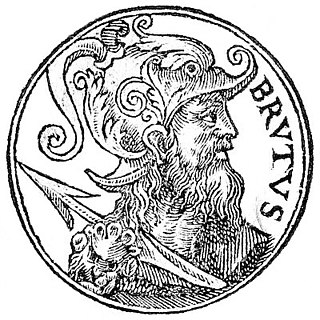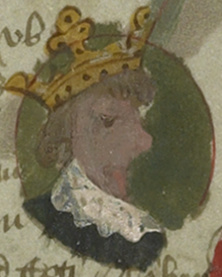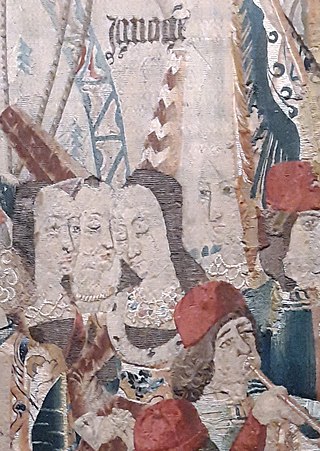Related Research Articles

Brutus, also called Brute of Troy, is a mythical British king. He is described as a legendary descendant of the Trojan hero Aeneas, known in medieval British legend as the eponymous founder and first king of Britain. This legend first appears in the Historia Brittonum, an anonymous 9th-century historical compilation to which commentary was added by Nennius, but is best known from the account given by the 12th-century chronicler Geoffrey of Monmouth in his Historia Regum Britanniae.

Corineus, in medieval British legend, was a prodigious warrior, a fighter of giants, and the eponymous founder of Cornwall.

Locrinus was a legendary king of the Britons, as recounted by the 12th-century chronicler Geoffrey of Monmouth in his Historia Regum Britanniae. He came to power in 1125BC.

Albanactus, according to Geoffrey of Monmouth, was the founding king of Albania or Albany. He is in effect Geoffrey's eponym for Scotland. His territory was that north of the Humber estuary. This myth was then taken up by Giraldus Cambrensis.

Camber, also Kamber, was the legendary first king of Cambria, according to the Geoffrey of Monmouth in the first part of his influential 12th-century pseudohistory Historia Regum Britanniae. According to Geoffrey, Cambria, the classical name for Wales, was named for him.
Humber the Hun was a legendary king of so-called "Huns" who, according to Geoffrey of Monmouth's pseudohistorical chronicle Historia Regum Britanniae, invaded the British Isles in about the 12th century BC from Scythia. His people successfully conquered Alba but he himself was drowned in the river named Humber after him during his campaign against Southern Britain. His descendants became the List of legendary kings of Pictland.
Estrildis was the beloved mistress of King Locrinus of the Britons and the mother of his daughter Habren, according to the 12th-century chronicler Geoffrey of Monmouth.
Gwendolen, also known as Gwendolin, or Gwendolyn was a legendary ruler of ancient Britain. She came to power in 1115BC.
Mempricius was a legendary king of the Britons, as recounted by Geoffrey of Monmouth. He came to power in 1060BC. He was the son of King Maddan, brother of Malin, and father of king Ebraucus.
Porrex I was a legendary king of the Britons as accounted by Geoffrey of Monmouth. He was the son of Gorboduc. and his death began a dynastic civil war.
Sisillius II was a legendary king of the Britons as recounted by Geoffrey of Monmouth. He came to power in 373BC.
Archgallo was a legendary king of the Britons as recounted by Geoffrey of Monmouth. He ruled from 339BC. He was the second son of King Morvidus and brother of Gorbonianus.
Elidurus the Dutiful was a legendary king of the Britons as recounted by Geoffrey of Monmouth. He reigned in the late fourth century BC. He was the third son of King Morvidus and brother of Gorbonianus, Archgallo, Ingenius, and Peredurus.

Historia regum Britanniae, originally called De gestis Britonum, is a pseudohistorical account of British history, written around 1136 by Geoffrey of Monmouth. It chronicles the lives of the kings of the Britons over the course of two thousand years, beginning with the Trojans founding the British nation and continuing until the Anglo-Saxons assumed control of much of Britain around the 7th century. It is one of the central pieces of the Matter of Britain.
Gorbonianus was a legendary king of the Britons as recounted by Geoffrey of Monmouth. He came to power in 349BC. He was the eldest son of King Morvidus, and the brother of Archgallo, Elidurus, Ingenius, and Peredurus.
Logres is King Arthur's realm in the Matter of Britain. The geographical area referred to by the name is south and eastern England. However, Arthurian writers such as Chrétien de Troyes and Wolfram von Eschenbach have differed in their interpretations of this.

Innogen is a character in the Historia Regum Britanniae and subsequent medieval British pseudo-history. She was said to have been a Greek princess, the daughter of King Pandrasus, and to have become Britain's first Queen consort as the wife of Brutus of Troy, the purported first king of Britain who was said to have lived around the 12th century BC. Her sons Locrinus, Camber, and Albanactus went on to rule Loegria, Cambria, and Alba respectively.

Hafren is a legendary British princess who was drowned in the River Severn by her repudiated stepmother Gwendolen. The legend appears in Geoffrey of Monmouth's pseudohistorical chronicle Historia Regum Britanniae. According to Geoffrey, Hafren is the eponym of the Severn, which bears one of Britain's most ancient river names.

Lloegyr is the medieval Welsh name for a region of Britain (Prydain). The exact borders are unknown, but some modern scholars hypothesize it ran south and east of a line extending from the Humber Estuary to the Severn Estuary, exclusive of Cornwall and Devon. The people of Lloegyr were called Lloegyrwys without distinction of ethnicity, the term applying to both Britons and Anglo-Saxons.

Sabrina is a feminine given name derived from Proto-Celtic *Sabrinā.